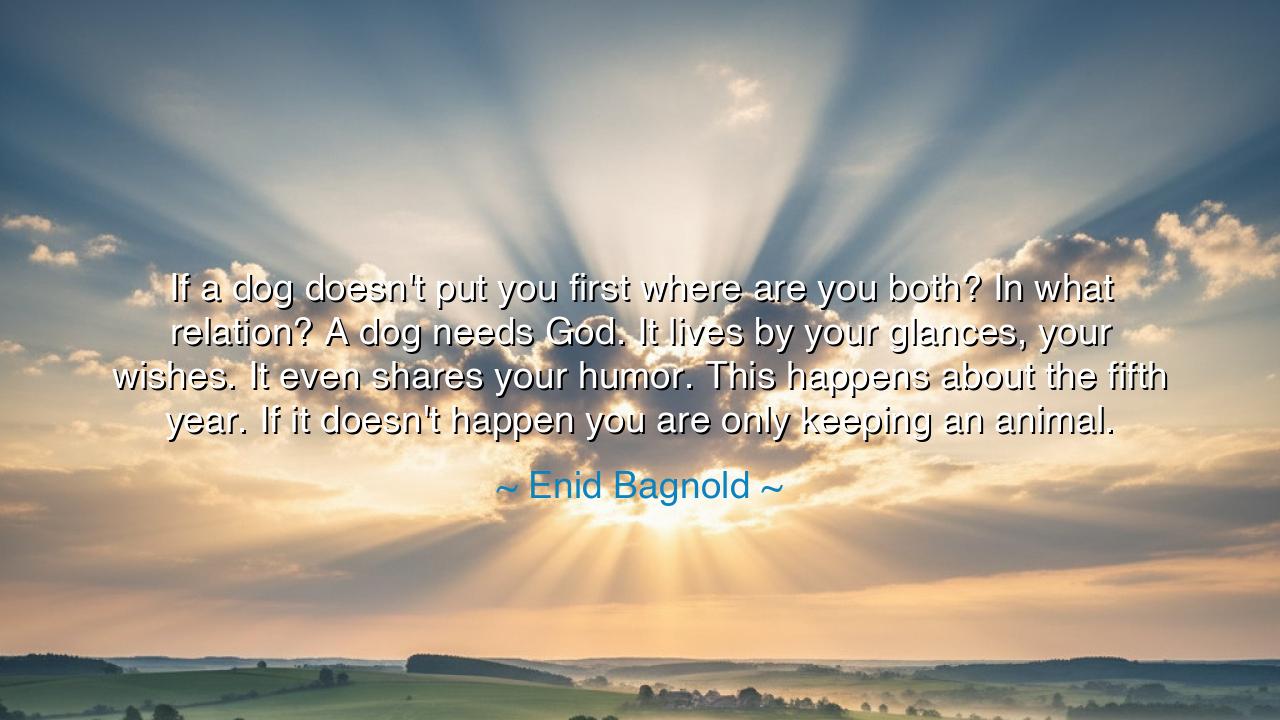
If a dog doesn't put you first where are you both? In what
If a dog doesn't put you first where are you both? In what relation? A dog needs God. It lives by your glances, your wishes. It even shares your humor. This happens about the fifth year. If it doesn't happen you are only keeping an animal.






The writer Enid Bagnold, author of National Velvet and a keen observer of the quiet poetry of human and animal bonds, once wrote: “If a dog doesn’t put you first where are you both? In what relation? A dog needs God. It lives by your glances, your wishes. It even shares your humor. This happens about the fifth year. If it doesn’t happen you are only keeping an animal.” In these words, Bagnold does not speak merely of pets and owners, but of devotion, trust, and the sacred relationship between love and understanding. Her insight touches upon something far deeper than companionship — it is about the spiritual unity between two beings, one who gives and one who receives, until they become mirrors of each other’s soul.
When she says, “A dog needs God,” she is not speaking in jest. She means that to a dog, the human it serves and loves is its god — the center of its world, the giver of meaning, warmth, and life itself. And yet, her words turn this idea gently upon the reader, for she implies that to be “God” to such a creature carries divine responsibility. To be loved with such absolute trust is to be charged with gentleness, patience, and grace. A dog’s devotion is pure, unconditional, unwavering — and it demands, in return, a human heart capable of gratitude and empathy. For if that bond of understanding never forms, then, as Bagnold writes, “you are only keeping an animal.” Love must evolve into communion, or it remains incomplete.
She also tells us that this transformation happens “about the fifth year” — a mark of time that reveals how deep bonds are forged not through instant affection, but through years of shared life. Only after seasons of living together — the long walks, the silences, the laughter, the mutual endurance of loneliness and change — does the dog begin to “share your humor.” That phrase, so gentle and profound, is the key to her meaning. Humor here is not comedy, but harmony — the mysterious moment when two beings begin to see the world through the same lens. To share humor is to share heart. It is when the eyes of the animal and the eyes of the human speak the same unspoken language of affection and understanding.
This ancient truth can be seen not only in the bond between human and dog, but in every true act of relationship — between teacher and student, parent and child, friend and friend. For love that endures always grows toward this shared vision, this blending of spirit. The great emperor Marcus Aurelius once wrote that “the soul becomes dyed with the color of its thoughts.” So too does a dog’s soul become dyed with the thoughts and moods of its human master. Over time, it reflects that person’s essence — their patience or anger, their serenity or restlessness. What Bagnold describes is not mere training, but transfiguration — the joining of lives through quiet daily faithfulness.
In the long annals of history, the devotion of animals to humankind has often been a reflection of our own moral character. It is said that Alexander the Great wept for his horse, Bucephalus, and built a city in its honor, not because the horse was mighty, but because it had been utterly loyal — a mirror of the hero’s courage. The bond between master and companion, forged in trust, became something almost sacred. The animal, who cannot speak, teaches the human what words often fail to express: that love is not domination, but stewardship, and that to be loved without condition is the purest form of grace.
Bagnold’s wisdom also holds a quiet warning. “If it doesn’t happen, you are only keeping an animal.” In this, she speaks to the tragedy of neglect — the failure to see beyond utility. Love without understanding is not love at all, and ownership without tenderness is mere possession. This truth extends far beyond the care of dogs; it is a lesson for all who hold power over another living being — a child, a student, a friend. When love does not grow toward understanding, when affection does not mature into respect, then what remains is emptiness. For love that does not transform both giver and receiver is incomplete, a shadow of what it could be.
The lesson in Enid Bagnold’s reflection is eternal: love demands attention, and attention is the truest form of prayer. Whether you care for a dog, a friend, or the world itself, do so not as a keeper but as a guardian of souls. See those who depend on you not as property but as partners in being — mirrors of your own spirit. And when, after years of patience and presence, they begin to “share your humor,” know that you have touched the divine.
So remember, dear listener: to love is to see, and to be seen is to live. If a dog — or any living creature — can look upon you and find its world reflected in your kindness, then you have become not a master, but a blessing. And in that quiet exchange of gaze and laughter, where no words are needed, you will find what Bagnold herself found: that even in the simplest bond between a person and a dog, there lives something holy — the proof that love, when tended faithfully, becomes eternal.






AAdministratorAdministrator
Welcome, honored guests. Please leave a comment, we will respond soon